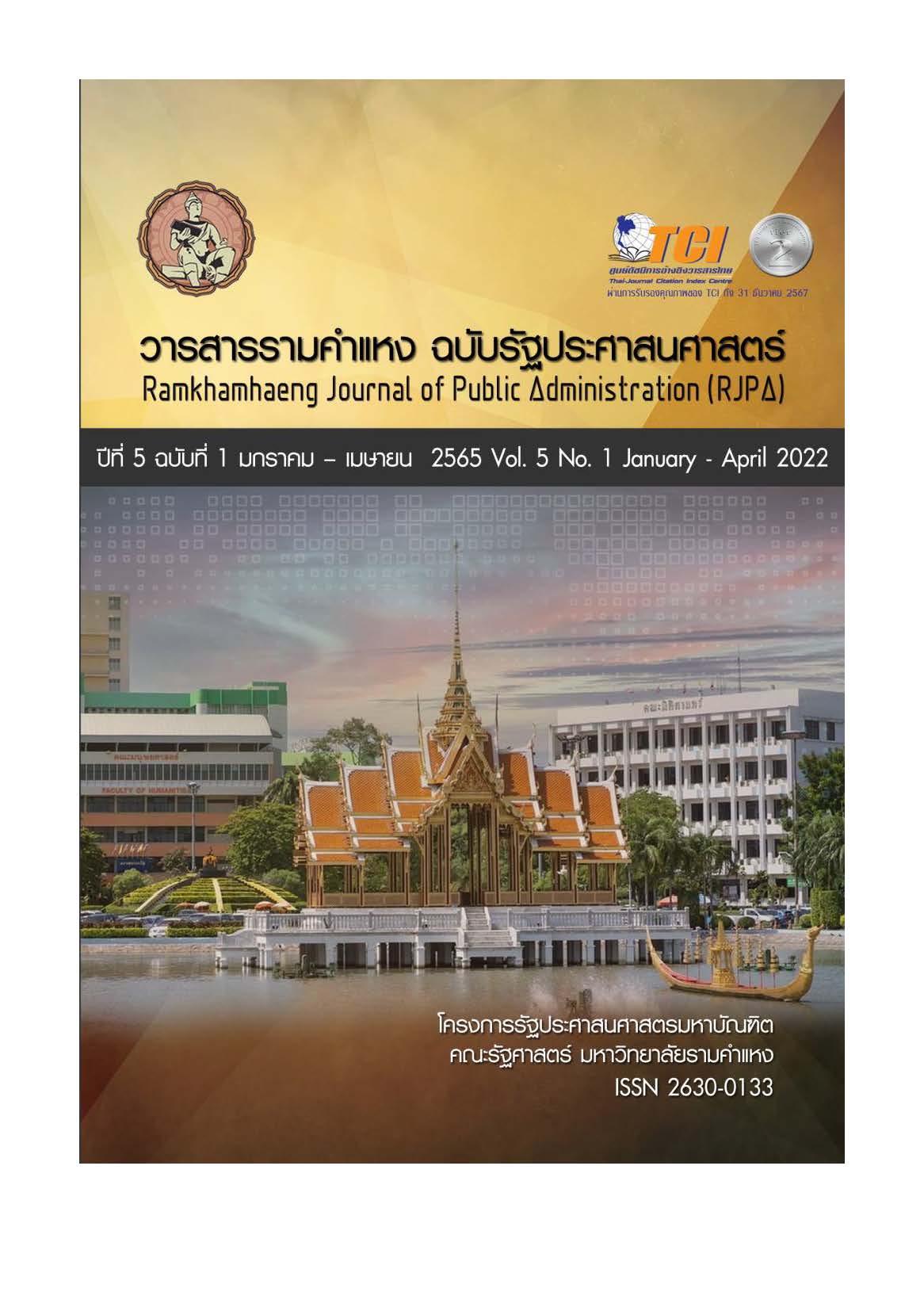ทฤษฎีความสัมพันธ์ระหว่างประเทศในศตวรรษที่ 21
คำสำคัญ:
ทฤษฎี, ความสัมพันธ์ระหว่างประเทศ, ศตวรรษที่ 21บทคัดย่อ
การวิจัยเรื่อง ทฤษฎีความสัมพันธ์ระหว่างประเทศในศตวรรษที่ 21 มีจุดประสงค์สำคัญคือ (1) เพื่อศึกษาพัฒนาการของทฤษฎีความสัมพันธ์ระหว่างประเทศ (2) เพื่อศึกษาทฤษฎีความสัมพันธ์ระหว่างประเทศในศตวรรษที่ 21 และ (3) เพื่อศึกษาประโยชน์และข้อจำกัดของทฤษฎีความสัมพันธ์ระหว่างประเทศ ผลการศึกษาพบว่า (1) การศึกษาทฤษฎีความสัมพันธ์ระหว่างประเทศเริ่มต้นจากงานเขียนของ อี. เอช. คาร์ร (E. H. Carr) เรื่อง The Twenty Years Crisis, 1919-1939 พิมพ์เผยแพร่ใน ค.ศ.1940 และงานเขียนของ ฮันส์ เจ. มอร์เกนทอ (H. J. Morgenthau) เรื่อง Politics Among Nations: The Struggle for Power and Peace พิมพ์เผยแพร่ใน ค.ศ.1948 ซึ่งเสนอมุมมองในสำนักสัจนิยมหรือการเมืองเพื่ออำนาจ ขณะเดียวกันก็ยังรักษามุมมองด้านเสรีนิยม อุดมคตินิยมหรือความร่วมมือระหว่างรัฐไว้ โดยวิตกว่าแนวคิดด้านสัจนิยมอาจทำให้เกิดการเปลี่ยนแปลงที่นำไปสู่ปัญหาในความสัมพันธ์ระหว่างประเทศได้ (2) ทฤษฎีความสัมพันธ์ระหว่างประเทศหลักในศตวรรษที่ 21 ที่ใช้อธิบายปรากฏการณ์หรือสถานการณ์ระหว่างประเทศ ได้แก่ สำนักสัจนิยม สำนักเสรีนิยม สำนักการประกอบสร้าง ทฤษฎีมาร์กซิส นอกจากนี้ยังมีทฤษฎีย่อย ๆ อีก 67 ทฤษฎี เช่น ทฤษฎีมาร์กซิสใหม่ ทฤษฎีสตรี ทฤษฎีกรีน (3) ประโยชน์ของทฤษฎีความสัมพันธ์ระหว่างประเทศคือเป็นกรอบความคิดในการอธิบายถึงสาเหตุของปรากฏการณ์และคาดการณ์แนวโน้มของสถานการณ์ที่เกิดขึ้น การศึกษาทฤษฎีความสัมพันธ์ระหว่างประเทศจะทำให้เกิดการตระหนักในตนเอง (self-awareness) ในการจะเลือกประยุกต์ทฤษฎีใดทฤษฎีหนึ่งมาอธิบายความสัมพันธ์ระหว่างประเทศตามอำนาจหรือขอบเขตที่ทฤษฎีจะอธิบายได้อย่างสอดคล้องกับปรากฏการณ์หรือสถานการณ์ที่ต้องการอธิบาย ส่วนข้อจำกัดของทฤษฎีความสัมพันธ์ระหว่างประเทศก็คือ แต่ละทฤษฎีมีอำนาจในการอธิบายปรากฏการณ์แตกต่างกันตามประเด็นปัญหาที่ต้องการอธิบาย
เอกสารอ้างอิง
กีรติ บุญเจือ. (2533). ทฤษฎีแห่งความรู้. ค้นเมื่อ 10 มกราคม 2562 จาก http:www.bananjomyut.com
ชัยวัฒน์ อัตพัฒน์. (2555). ญาณวิทยา (ทฤษฎีความรู้). กรุงเทพฯ: สาละพิมพการ.
ฐิติวุฒิ บุญยวงค์วิวัชร. (2551). ลักษณะทั่วไปของการศึกษาความสัมพันธ์ระหว่างประเทศ. ค้นเมื่อ 1 กรกฎาคม 2561 จาก http.//www01blog-post-1051. Html?m=1
นรุตม์ เจริญศรี. (2556). ทฤษฎีความสัมพันธ์ระหว่างประเทศ. เชียงใหม่: บีบุ๊ก ก๊อปปี้ปรินซ์.
ปานทิพย์ ศุภนคร. (2538). ปรัชญาเบื้องต้น. กรุงเทพฯ: สำนักพิมพ์มหาวิทยาลัยรามคำแหง.
Affarsi, H. (2017). The major theories of international relations. Retrieved July 12, 2018, from https://www.profolus.com/topics/major-theories-of-international-relations/
Aron, R. (1966). Peace and War: A Theory of International Relations. New York: Doubleday & Company.
Burcill, S. (2005).Theories of International Relations. New York: Palgrave Macmillan.
Carr, E. H. (1940). The Twenty Years’ Crisis United Kingdom. New York: Palgrave Macmillan.
Cristol, J. (2017). International Relations Theory. Retrieved April 11, 2018, from http://www.oxfordbibliographies.Com/view/document /obo- 9780199743292/ obo-9780199743292-0039.xml
Deutsch, K. (1978). The Analysis of international Relations. New Jersey: Prentice-Hall.
Dougherty, J. & Pfaltzgraff, R.L. (1972). Contending theories of International Relations: A Comprehensive Survey. New York: Free Press.
Ebenstein, W. (1960). Great political thinkers Plato to the present. New York: Halt, Rinehart and Winston.
Griffiths, M. (2007). International Relations Theory for the Twenty-First Century. London: Routledge.
Mcglinchey, S. (ed) . (2017). International Relations Theory. Retrieved June 13, 2018 from http://www-e-ir.info/wp-content/uploads/2017/11/international-Relations-Theory-E-IR.pdf.
Milner, H. (1997). Institutions and Information: Domestic Politics and International Relations. New Jersey: Princeton University Press.
Morgan, P. (1981). Theories and Approaches to International Politics: What are we to think?. New Jersey: Transaction Books.
Morgenthau, H. J. (2011). Politics Among Nations: The struggle for Power and Peace. Boston: McGraw-Hill.
Monteiro, N. (2014). Theory of Unipolar Politics. New York: Cambridge University Press.
Oprisko, R. (2013). IR Theory’s 21st Century Experiential Evolution. Retrieved May 16, 2018 from https://www.e-ir.info/2013/05/25/the-fall-of-the-state-and-the-rise-of-the-individuals-ir-theorys-21st-century-experiential-evolution/
Reiter, D. (2015). “Should We leave behind the Subfield of international Relations?”. Annual Review of Political Science 18(1), 81-499.
Sen, G. (2014). International Relations and International Security in the 21st Century: The World in Transition. New Delhi: KW Publishers Pvt Ltd.
Skidmore, W. (1979). Theoretical Thinking in Sociology. Cambridge: Cambridge University Press.
Snyder, J. (2004). “One World, Rival Theories”. Foreign Policy 145, 52-62.
Wendt, A. (2000). Social Theory of International Politics. Cambridge: Cambridge University Press.
ดาวน์โหลด
เผยแพร่แล้ว
รูปแบบการอ้างอิง
สัญญาอนุญาต
ลิขสิทธิ์ (c) 2025 วราภรณ์ จุลปานนท์

อนุญาตภายใต้เงื่อนไข Creative Commons Attribution-NonCommercial-NoDerivatives 4.0 International License.



